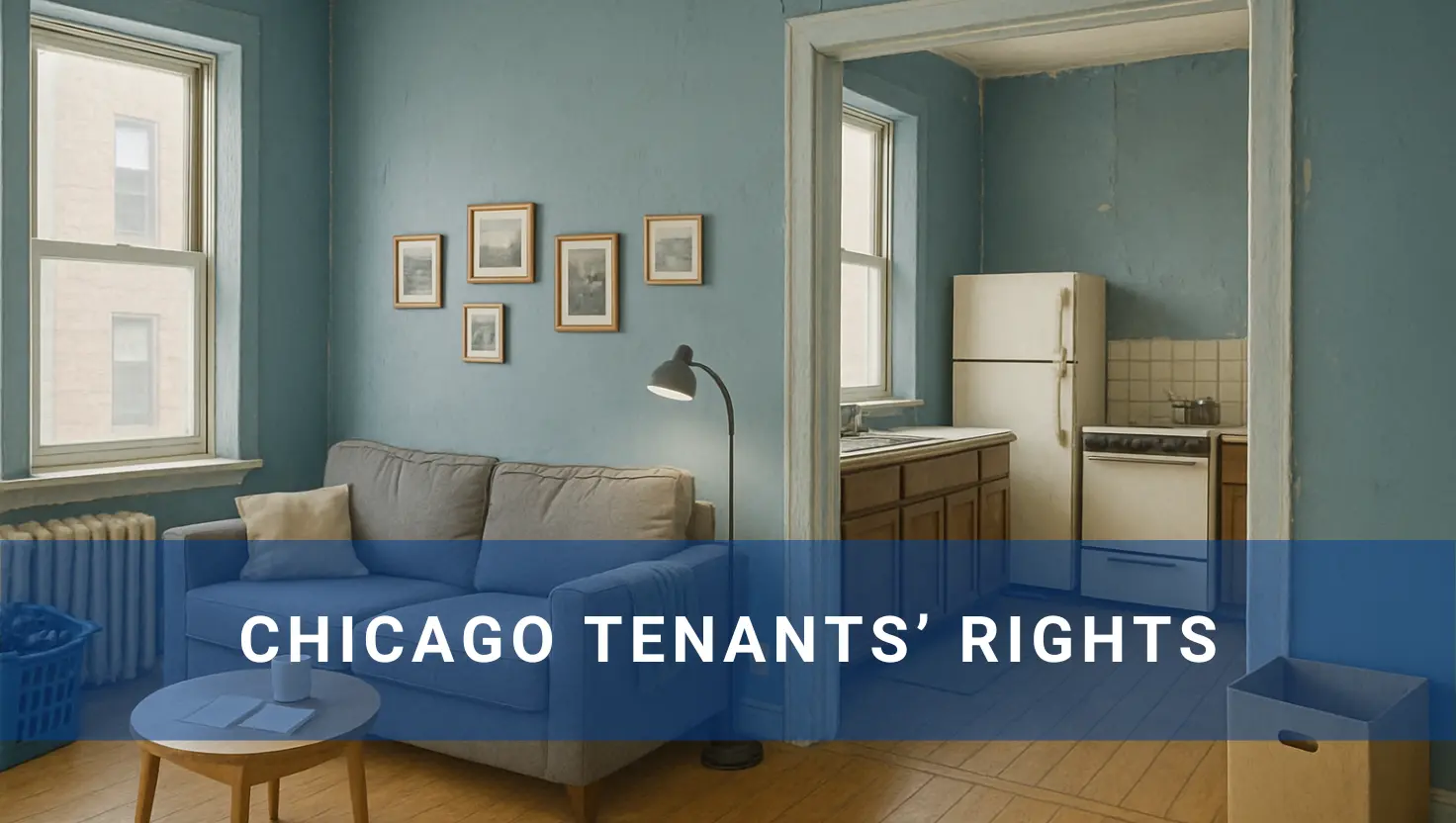Chicago tenants’ rights are among the strongest in the country, thanks to the Chicago Residential Landlord and Tenant Ordinance (RLTO). This law sets clear rules for landlords and gives renters powerful tools to address unsafe living conditions, recover wrongfully withheld security deposits, and stop harassment. Whether you rent a studio apartment or a multi-bedroom unit, the RLTO is designed to protect you.
These protections matter now more than ever. Chicago’s rental market is tight, with rising rents and increased demand for affordable housing. In this environment, some landlords may cut corners or ignore their legal obligations. The RLTO gives tenants clear rights and specific remedies – including the ability to recover damages, terminate a lease, or have attorney’s fees paid by the landlord in many cases.
This guide is the most comprehensive plain-language explanation of Chicago tenants’ rights available online. It breaks down the RLTO in detail, explains how it works in real life, and gives practical examples of how tenants can use the law to protect themselves. It also addresses related Illinois rules when they overlap with Chicago law.
By the end, you will understand:
- Which rental units the RLTO covers
- The specific rights you have under the law
- What your landlord is prohibited from doing
- How to enforce your rights when they are violated
If you are a renter in Chicago, knowing these rules can mean the difference between losing your deposit, being pushed out illegally, or living with dangerous conditions – and securing the home and compensation you are entitled to.
Key Takeaways
- The RLTO is your strongest protection as a Chicago tenant. It covers most rental units and guarantees rights that cannot be waived.
- You have enforceable rights in areas like privacy, repairs, essential services, lease terms, security deposits, and eviction protections.
- Professional legal help can make the difference – a tenants’ rights lawyer can navigate the RLTO, preserve your claims, and maximize your recovery.
- Document issues and act quickly – many remedies require written notice and strict timelines to be effective.
Understanding the Chicago Residential Landlord and Tenant Ordinance (RLTO)
The Chicago Residential Landlord and Tenant Ordinance is the foundation of Chicago tenants’ rights. It is a city law that defines what landlords must do, what tenants are entitled to, and what happens when those rules are broken.
The RLTO was created to protect public health, safety, and housing quality. It applies to nearly every rental unit in the City of Chicago, and it cannot be waived or overridden by a lease agreement. This means that even if your landlord puts language in your lease that contradicts the RLTO, that clause is unenforceable.
Which properties are covered
Most residential rental units within Chicago city limits are covered. However, there are specific exemptions, including:
- Units in buildings with six or fewer apartments where the owner of your unit lives in the building
- Hotel or motel rooms, unless rented by the month and occupied for more than 32 days
- Dormitories, shelters, and employee housing
- Hospitals, convents, monasteries, and nursing homes
- Non-residential properties
- Properties in suburban Cook County (these are regulated by the CCRTLO)
- Cooperative units where the tenant is a shareholder in the co-op
If your rental falls under one of these exemptions, you may still have rights under Illinois state law or Cook County’s tenant ordinance if you live outside the city of Chicago but within the county.
How the RLTO fits with other laws
The RLTO works alongside state and federal housing laws. It adds to those protections rather than replacing them. For example:
- Illinois state law sets general landlord-tenant rules and building code requirements
- Federal housing laws prohibit discrimination and regulate subsidized housing programs
- Chicago building codes set safety and maintenance standards for residential property
When multiple laws apply, the rule that provides the most protection to the tenant usually governs.
Why the RLTO matters
Without the RLTO, many Chicago tenants would have to rely only on state landlord-tenant law, which offers far fewer protections. Under the RLTO, tenants can:
- Hold landlords financially accountable for violations
- Break a lease without penalty when conditions are unsafe or services are not provided
- Recover attorney’s fees if they win their case
- Stop illegal evictions and harassment
The RLTO turns what might otherwise be informal landlord promises into enforceable legal obligations.
From the law to your daily rights
Now that you know what the RLTO is and which properties it covers, the next step is to understand what it means for your day-to-day life as a renter. The ordinance sets out specific Chicago tenants’ rights that touch almost every part of the rental experience – from how and when a landlord can enter your home to how they must handle your security deposit. Each right comes with built-in remedies if the landlord fails to follow the law. We will walk through these rights one by one, starting with your right to privacy.
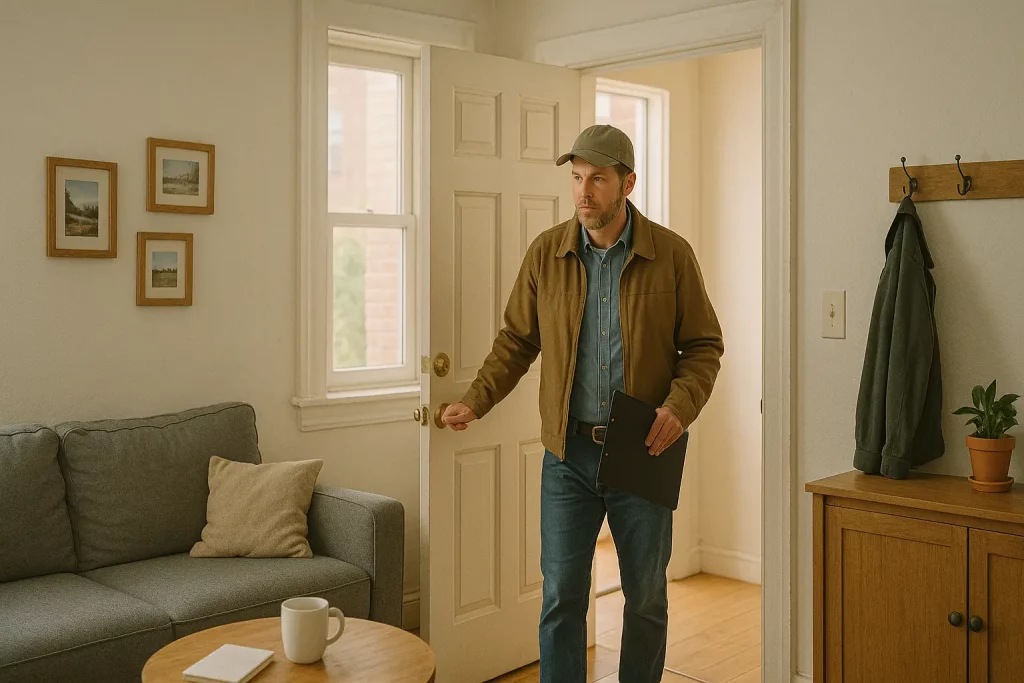
Right to Privacy and Controlled Landlord Access
One of the most important Chicago tenants’ rights is the right to privacy in your home. While landlords own the property, they do not have the right to enter your apartment whenever they wish. The RLTO strictly limits when and how a landlord can come inside.
When a landlord can enter
A landlord may only enter your apartment for specific, legitimate reasons, such as:
- Making necessary or agreed repairs, alterations, or improvements
- Supplying necessary or agreed services
- Conducting city-required inspections
- Showing the unit to prospective tenants, buyers, lenders, contractors, or workers
- Checking for compliance with the lease
- Handling an emergency, such as a burst pipe or fire
- Entering when repairs elsewhere in the building unexpectedly require access to your unit
Required notice and timing
In most situations, the landlord must give you at least two days’ notice before entering. Notice must be given in good faith using a method reasonably likely to reach you – for example, by mail, phone, or a written note at your door.
The law also limits the hours of entry. Unless you agree otherwise, the landlord may only come between 8:00 a.m. and 8:00 p.m.
Exceptions for emergencies and urgent repairs
There are two situations where a landlord may enter without notice or consent:
- Emergencies, such as a fire, gas leak, or major water leak
- Unexpected repair needs in another part of the building that require immediate access to your unit
Even in these cases, the landlord must tell you they entered within two days afterward.
Remedies for unlawful entry
If your landlord enters without proper notice, for an improper reason, or in a harassing manner, you have options:
- Ask a court for an order requiring the landlord to stop
- Terminate your lease with proper notice
- Sue for the greater of one month’s rent or twice your actual financial loss
- Recover attorney’s fees if you win
Example
You come home from work to find your landlord in your apartment “just checking on things” without notice. This is a clear RLTO violation. You could choose to terminate your lease or hire an attorney and claim damages against your landlord.

Right to a Safe and Well-Maintained Home
Another core Chicago tenants’ right under the RLTO is the right to live in a rental unit that is safe, sanitary, and kept in good repair. The landlord’s duty to maintain applies to the entire property – both your apartment and the common areas shared with other tenants.
Landlord’s duty to maintain
Under RLTO §5-12-070, the landlord must keep the property in compliance with all applicable building, housing, and health codes. They must promptly make repairs when something breaks or deteriorates. This obligation covers far more than just obvious repairs.
Some common violations include:
- Failing to maintain the structural integrity of the building
- Broken floors, unsafe stairways, or missing handrails
- Blocked or unsafe exits and missing fire escape signage
- Missing or non-functional smoke detectors, alarms, or fire extinguishers
- Broken elevators
- Non-working toilet, sink, bathtub, or shower
- Heating systems that do not meet code or no heat at all
- Lack of hot or cold running water
- Inadequate lighting in halls or stairways
- Roof leaks or rodent infestations
- Broken windows, doors, or locks
- Unrepaired porches or decks in unsafe condition
- Pest infestations not addressed by the landlord
- Lack of garbage facilities or failure to remove trash
- Unsafe electrical wiring or plumbing
- Failure to maintain appliances or equipment provided with the unit
Remedies if the landlord fails to maintain
The RLTO gives tenants several ways to respond to maintenance failures:
- Lease termination
- Send the landlord written notice describing the violation and stating the lease will end in 14 days if the problem is not fixed.
- If repairs are not made, the lease ends, you must move out within 30 days after that, and the landlord must return your prepaid rent, security deposit, and interest.
- Repair-and-deduct
- If the repair costs less than the greater of $500 or half your monthly rent, you may give written notice that you will fix the problem if it is not addressed within 14 days (or sooner for emergencies).
- If the landlord does not act, you may hire a qualified repair person, pay for the work, and deduct the cost from your rent.
- Withholding rent
- If the issue substantially reduces the value of the apartment, you may notify the landlord and then withhold part of the rent until repairs are made.
- The amount withheld must be reasonable and reflect the reduced value.
- Damages and injunctive relief
- You may sue for financial damages or ask a court to order the landlord to make repairs.
- If you win, the landlord must also pay your reasonable attorney’s fees.
Example
You start noticing a few unwelcome “roommates” scurrying across your kitchen floor at night. Within a week, it’s clear you have a mouse problem worthy of its own nature documentary. You send your landlord a written notice explaining the infestation and giving 14 days to arrange for extermination. When nothing happens, you hire a licensed pest control company, pay $325 for the service, and deduct it from your rent. You’ve lawfully exercised your repair-and-deduct right under the RLTO – and hopefully reclaimed your kitchen from its tiny squatters.

Right to Essential Services
Some problems in a rental unit are not just inconvenient – they are emergencies. Under the RLTO, Chicago tenants have the right to essential services, and landlords must provide them at all times. An “essential service” includes heat, running water, hot water, electricity, gas, and plumbing.
If the landlord fails to provide one of these services, and the failure creates an immediate danger to health or safety, tenants have special rights that can be used quickly.
Immediate steps you can take
If the problem is not caused by the utility company’s inability to provide service, you may:
- Obtain the service yourself and deduct the cost
- You can pay to restore the service (for example, hiring a plumber to fix a burst pipe) and subtract the expense from your rent.
- Keep receipts and only deduct the actual, reasonable cost.
- Sue for damages
- You can bring a claim for the reduced value of your apartment while the service is unavailable.
- Move into substitute housing
- If the problem makes your home unlivable, you can temporarily relocate.
- You don’t owe rent for the time you are gone, and you may recover the reasonable cost of substitute housing up to your monthly rent amount.
- Withhold part of your rent
- If the landlord fails to fix the problem within 24 hours of written notice, you can withhold a portion of your rent that reflects the reduced value of the unit.
- Terminate the lease
- If the problem lasts more than 72 hours after notice, you can end the lease.
- You must move out within 30 days after the 72-hour period ends, and the landlord must return your security deposit, unpaid rent, and interest.
Example
It’s mid-January, and your heat stops working. You send your landlord written notice immediately. When nothing is fixed within 24 hours, you buy two space heaters and deduct the cost from your next rent. By day four, the furnace is still out, so you move in with a friend and notify your landlord you are terminating the lease. Under the RLTO, you’ve exercised two separate rights: rent deduction for the heaters and lease termination for the ongoing loss of heat.
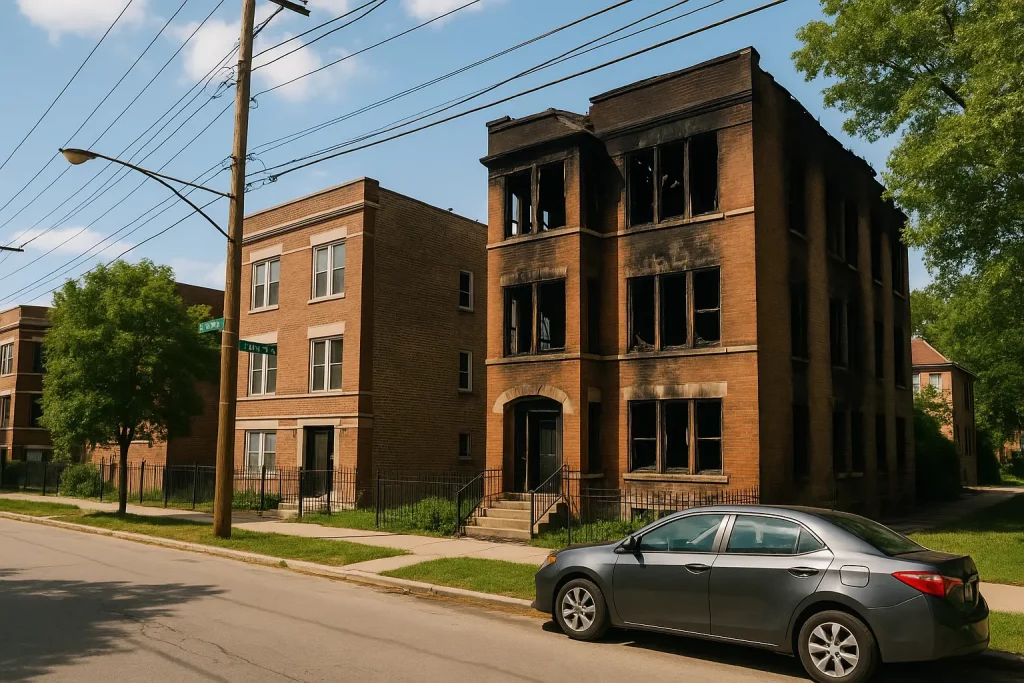
Right to Safe Housing After Fire or Casualty Damage
A serious event like a fire, flood, or structural collapse can instantly make a home unsafe. The RLTO recognizes that tenants should not be forced to keep paying full rent – or remain in a dangerous situation – when a casualty damages their apartment.
When this right applies
Casualty damage includes events such as:
- Fires or explosions
- Severe flooding
- Storm or wind damage
- Structural failures, such as a collapsed porch or ceiling
The key is whether the damage causes the unit to violate the lease or the city’s housing codes.
Your options after casualty damage
If a casualty makes the apartment unsafe, you may:
- Vacate immediately and terminate the lease
- You can move out right away and send the landlord written notice within 14 days stating you are ending the lease.
- The termination date is the date of the casualty.
- Stay in part of the unit and reduce rent
- If only part of the apartment is unusable, such as one bedroom being water damaged, you can remain in the rest and pay reduced rent that matches the loss in value.
- Terminate later if repairs are promised but not completed
- If the landlord promises to fix the damage and fails to do so within a reasonable time, you can give 14 days’ written notice and end the lease.
In every case, the landlord must return prepaid rent, your security deposit, and interest for the unused rental period.
Example
A burst pipe in the apartment above yours floods your living room, shorting out the electrical system and leaving the carpet soaked. The landlord promises repairs, but after two weeks nothing has been done. You send a 14-day termination notice, move out before the deadline, and recover your deposit and unused rent. Under the RLTO, you acted within your rights – and avoided living in a makeshift indoor swamp.
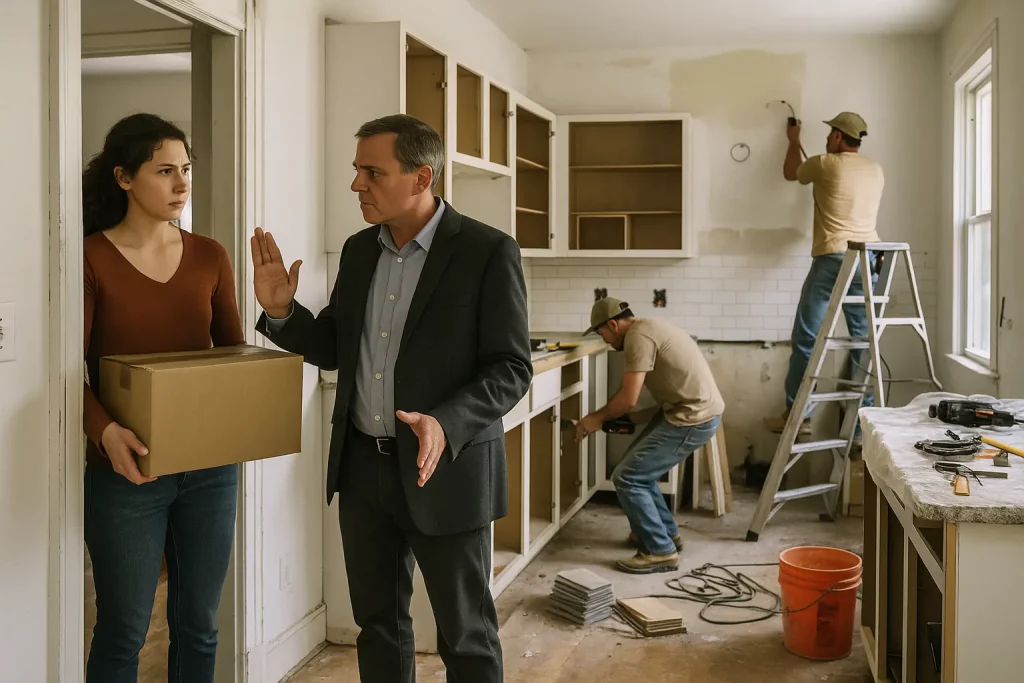
Right to Possession at Lease Start
When you sign a lease, you expect to move into your new apartment on the agreed date and find it in habitable condition. The RLTO protects this expectation by giving Chicago tenants the right to take possession at the start of the lease – and to receive a unit that meets the city’s minimum housing standards.
When this right applies
A violation occurs if:
- The landlord cannot or will not give you the keys on the agreed date
- Someone else is still occupying the unit when your lease begins
- The unit is so unsafe or unsanitary that it violates the lease or the city’s housing code
Your remedies if the landlord fails to deliver possession
If you cannot take possession on time, you may choose either of these options:
- Terminate the lease
- Give the landlord written notice that you are ending the agreement.
- The landlord must return all prepaid rent, your security deposit, and interest.
- Demand performance
- You can require the landlord to honor the lease, take legal action to gain possession, and seek damages for any losses you suffer.
If the failure to deliver possession is willful, you may also recover the greater of two months’ rent or twice the actual damages you suffered. In either case, you can recover reasonable attorney’s fees if you win.
Example
Your lease starts on May 1, but when you arrive with your moving truck, the previous tenant is still living there. You call the landlord, who admits they never finished the eviction process. You give written notice terminating the lease and demand the return of your security deposit and first month’s rent. Under the RLTO, you are entitled to get that money back – and if the delay was willful, you could seek additional damages.
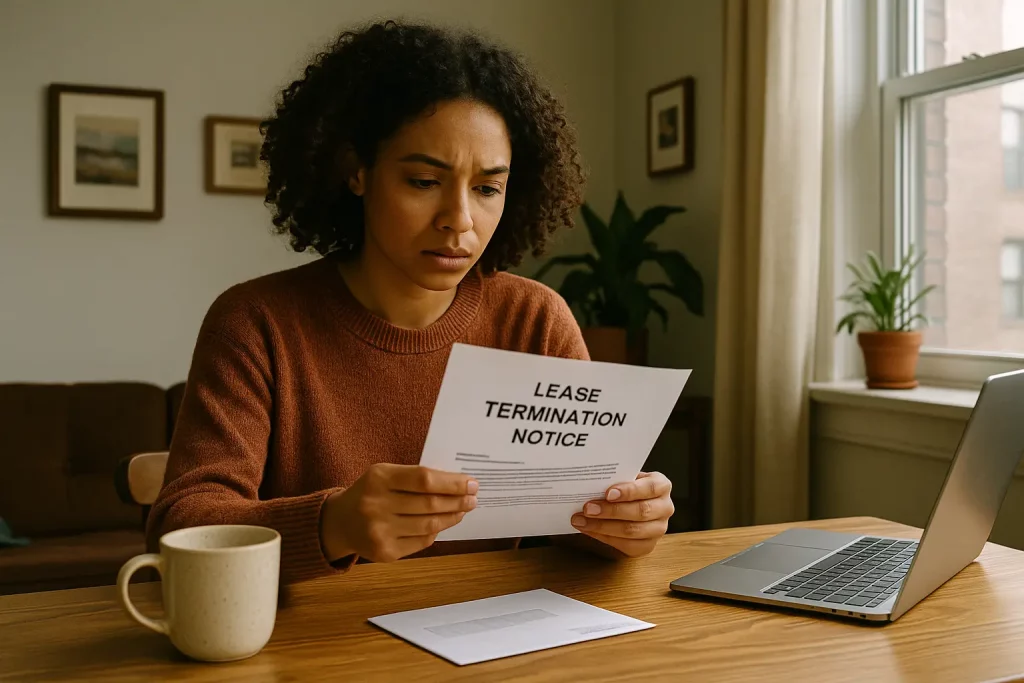
Right to Fair Notice of Lease Termination or Rent Increases
Chicago tenants are protected by the Fair Notice Ordinance, which is part of the RLTO. This law makes sure landlords cannot suddenly end your lease or raise your rent without giving you enough time to plan. The notice requirements apply to both written leases and month-to-month tenancies.
How much notice you must receive
The amount of notice depends on how long you have lived in your apartment:
- Tenancy under 6 months: The landlord must give at least 30 days’ written notice before ending your lease or raising the rent. If they fail to do so, you may stay up to 60 days after notice is given at the current rent.
- Tenancy from 6 months to 3 years: You must receive at least 60 days’ written notice. If the landlord fails to give proper notice, you can remain in the unit up to 60 days after notice is given at the current rent.
- Tenancy over 3 years: You must receive at least 120 days’ written notice. If the landlord does not give proper notice, you can remain in the unit for up to 120 days after notice is given at the current rent.
What the notice must include
The notice must be in writing and clearly state whether the landlord is:
- Ending your lease
- Refusing to renew your lease
- Increasing the rent and by how much
Why this matters
These rules prevent situations where tenants are blindsided by a sudden move-out deadline or steep rent hike. They give you time to search for another apartment, budget for a rent increase, or negotiate with your landlord.

Right to Fair Security Deposit Handling
Chicago tenants’ rights include some of the strictest security deposit protections in the country. The RLTO sets detailed rules for how landlords must collect, hold, manage, and return security deposits. Violating these rules can cost a landlord up to three times the deposit amount, plus attorney’s fees and court costs.
How your deposit must be held
A landlord must:
- Place your deposit in a federally insured, interest-bearing account at a bank located in Illinois
- Keep your deposit separate from their own funds so it is not subject to their creditors’ claims
- Disclose the name and address of the bank in your written lease (or in writing within 14 days if there is no written lease)
- Notify you within 14 days if the deposit is moved to another bank
Receipts for your deposit
When you pay a security deposit, the landlord must give you a signed receipt that includes:
- The amount paid
- The name of the person receiving it
- The name of the landlord (if different from the person receiving the deposit)
- The date received
- A description of the unit
If you pay electronically, the landlord must provide an electronic receipt with the same details.
Interest on your deposit
If the landlord holds your deposit for more than six months, they must pay you interest once every 12 months. This payment can be in cash or applied as a rent credit. The interest rate is set annually by the City of Chicago.
Returning your deposit
When you move out, the landlord must return your deposit:
- Within 45 days in most cases
- Within 7 days if you leave because of fire or casualty damage
The landlord may deduct only:
- Unpaid rent that has not been lawfully withheld
- Costs to repair damage beyond ordinary wear and tear
If deductions are made for damage, the landlord must:
- Send you an itemized list of damages and the estimated or actual repair costs within 30 days of move-out
- Provide copies of paid receipts if actual costs are listed
- Provide receipts within 30 days after the estimate if estimated costs were listed
Penalties for violations
If the landlord fails to follow these rules, they must pay you two times the deposit amount, plus interest, plus the deposit itself if not returned. You can also recover your reasonable attorney’s fees.
Example
You move out of your apartment in good condition, but your landlord never returns your $1,200 deposit and does not send an itemized statement of damages. Under the RLTO, you could sue and recover $3,600 (two times the deposit plus the deposit itself), plus interest and attorney’s fees.
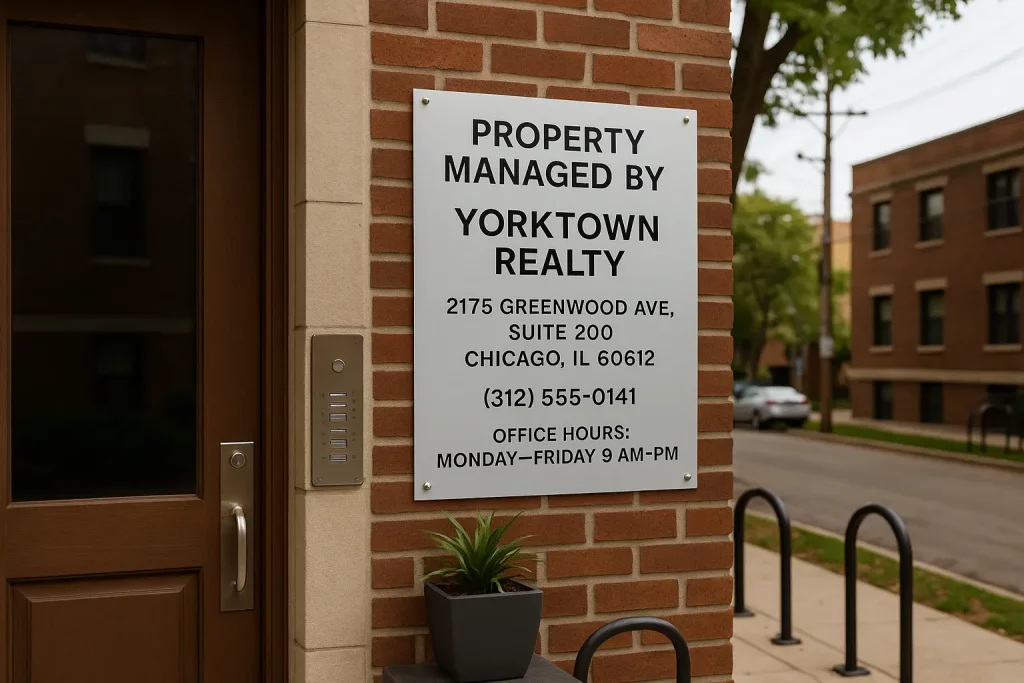
Right to Know Who Owns or Manages the Property
Chicago tenants have the right to know exactly who is responsible for their building and who can accept legal notices on the landlord’s behalf. This helps ensure you can reach the correct person if there is a problem, dispute, or legal issue.
Required disclosures
At or before the start of your tenancy, the landlord must provide you with the name, address, and phone number of:
- The owner or authorized property manager
- The person authorized to receive legal notices, service of process, and tenant communications
This information must be given in writing and must be kept up to date throughout your tenancy.
Changes during your tenancy
If there is a change in ownership, management, or the authorized agent, the landlord must update you with the new contact information. This prevents situations where tenants are left wondering who is actually in charge.
Remedies for violations
If the landlord fails to make these disclosures and does not fix the problem within 14 days after you notify them in writing, you may:
- Terminate your lease, or
- Recover one month’s rent, whichever you prefer
In either case, you can also recover reasonable attorney’s fees if you win.
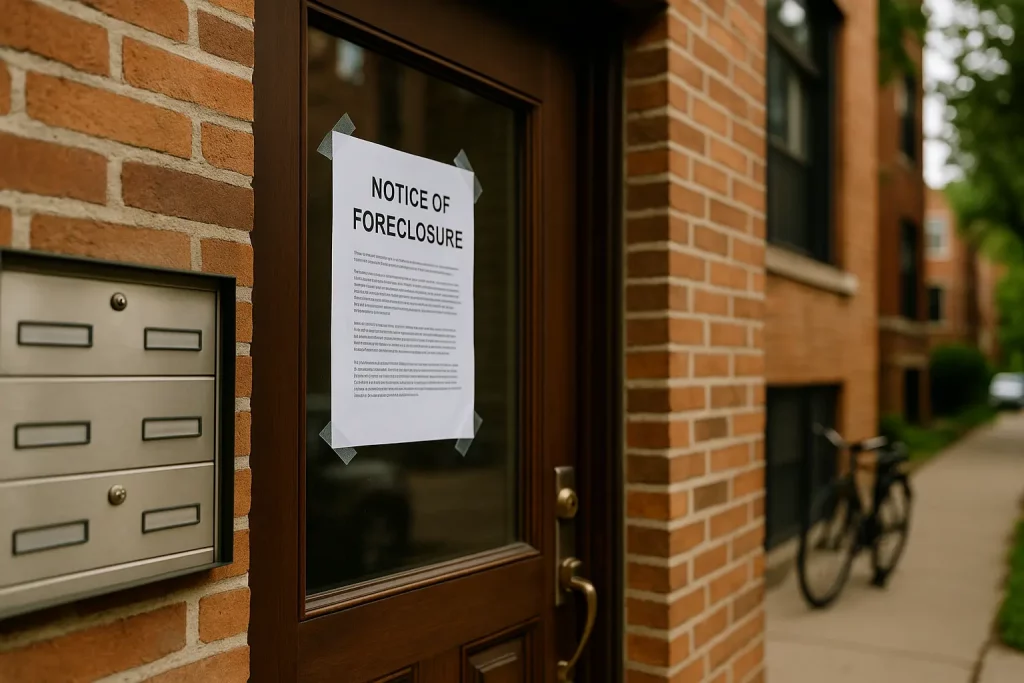
Right to Foreclosure Disclosure
Sometimes a landlord falls behind on their mortgage, and the property enters foreclosure. Chicago tenants’ rights include the right to be notified if this happens, so you are not caught off guard by changes in ownership or management.
When disclosure is required
A landlord must notify you in writing within 7 days of being served with a foreclosure complaint. This applies whether you are already living in the unit or are a prospective tenant about to sign a lease.
The notice must also be given to any third party who regularly pays rent on your behalf, such as a housing assistance program or family member.
What the notice must say
The landlord must tell you:
- The court where the foreclosure is filed
- The case name and case number
- Specific language stating that this is not a notice to vacate, that you must still pay rent, and that the landlord is still responsible for their obligations under the lease
- A promise that you will be notified if ownership changes
Remedies for violations
If your landlord fails to make this disclosure, you may:
- Terminate your lease with written notice, and/or
- Recover $200 in damages, plus reasonable attorney’s fees
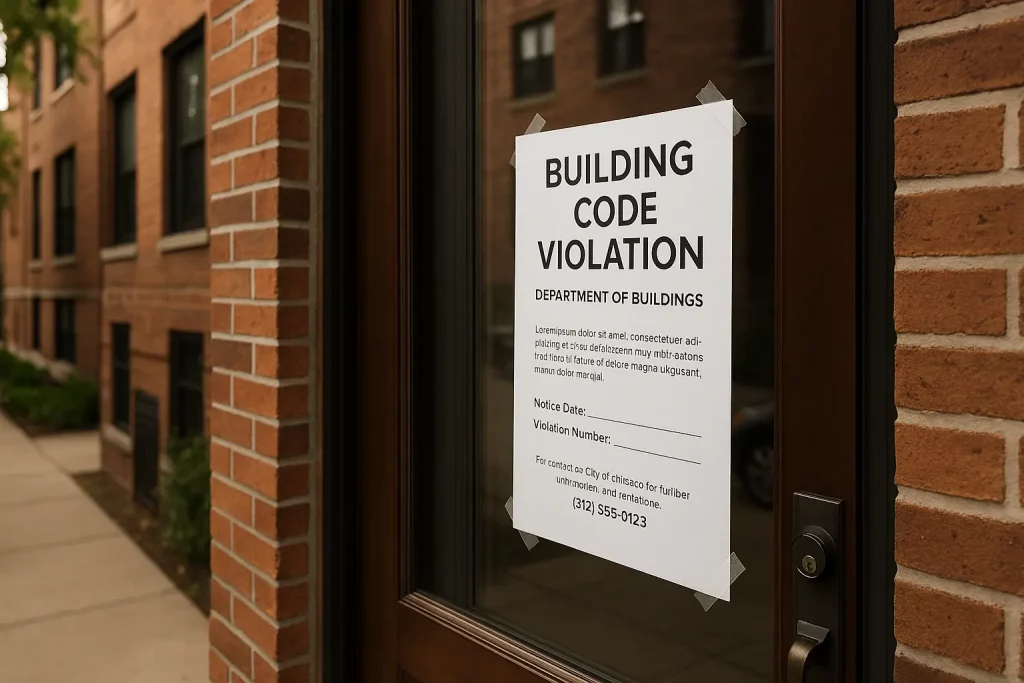
Right to Habitability Disclosures
Chicago tenants’ rights include the ability to know about serious problems in a rental property before signing a lease or renewing one. The RLTO requires landlords to disclose certain conditions that could affect your health, safety, or comfort.
What must be disclosed
Before you enter into a lease or renew your tenancy, the landlord must give you written notice of:
- Any building code violations for your unit or common areas that have been cited by the City of Chicago within the past 12 months
- Any pending housing code enforcement cases or administrative hearings involving the unit or building
- Any notice from the city or a utility company stating that water, gas, electricity, or other essential service will be shut off, including the type of service and date of termination
Continuing disclosure obligation
If one of these issues arises after you move in, the landlord must notify you promptly. They cannot hide newly discovered violations or upcoming utility shutoffs during your tenancy.
Remedies for violations
If the landlord fails to make these disclosures and does not correct the violation within 14 days of receiving written notice from you, you may:
- Terminate your lease, or
- Recover one month’s rent, whichever you choose
In either case, you may also recover reasonable attorney’s fees if you win.
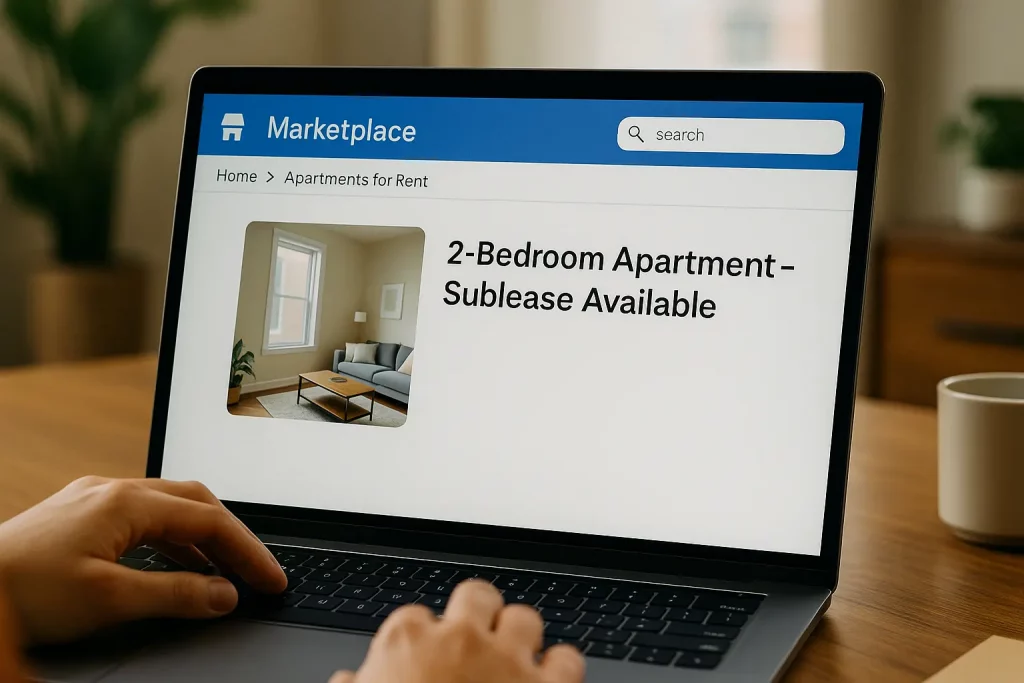
Right to Sublease and Landlord’s Duty to Mitigate Damages
Chicago tenants have the right to sublease their apartment, and landlords cannot unreasonably block that process. The RLTO also requires landlords to take reasonable steps to reduce their financial loss if a tenant ends a lease early.
Your right to sublease
You can sublease your apartment if you find another tenant to take over the unit. While the landlord can require you to get their consent, they cannot:
- Unreasonably refuse a qualified subtenant
- Charge extra fees beyond what is in your lease
- Add new terms or conditions to the sublease that would not apply to you
Landlord’s duty to mitigate damages
If you end your lease early without legal cause, the landlord must make a good-faith effort to re-rent the apartment at a fair market rate. This means:
- Advertising the unit
- Showing it to potential tenants
- Offering it at a reasonable rent similar to comparable units
If the landlord re-rents the unit, you are only responsible for any difference between your rent and the new tenant’s rent for the remainder of your lease term. You may also be responsible for the landlord’s reasonable advertising costs.
If the landlord makes a good-faith effort but cannot find a replacement tenant, you may owe rent for the remainder of the lease term.
Example
You get a new job in another state and need to move three months before your lease ends. You find a friend who is qualified and willing to take over the apartment, but your landlord says no without giving a reason. Under the RLTO, this could be an unreasonable refusal, allowing you to challenge the landlord’s decision and avoid paying rent for the rest of the lease.
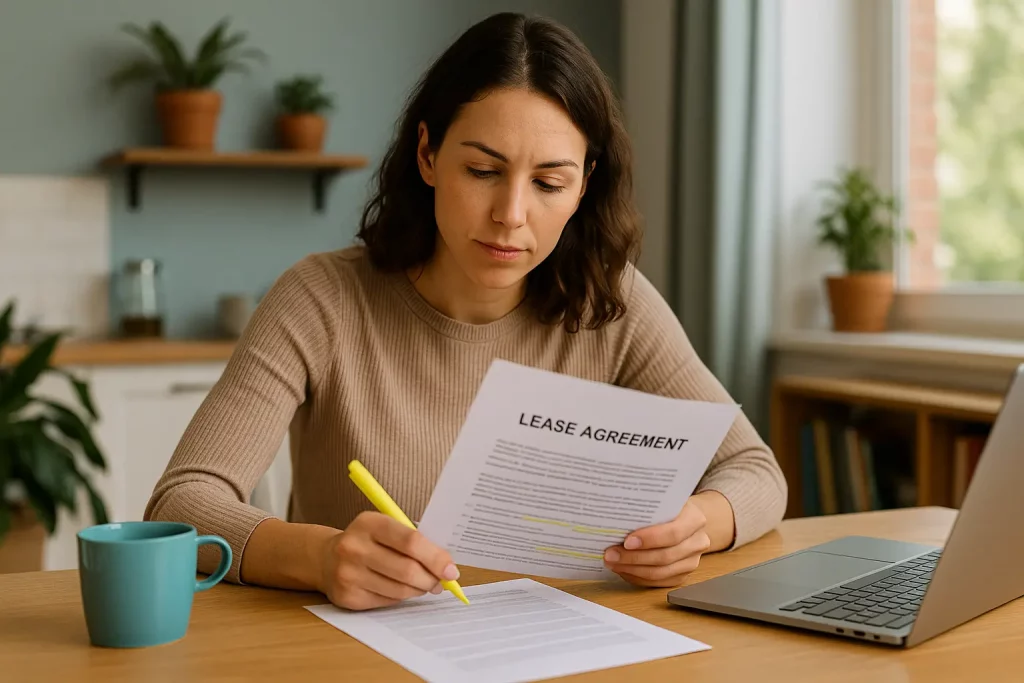
Right to Fair Lease Terms
Chicago tenants’ rights include protection from unfair or abusive lease provisions. The RLTO makes certain lease clauses unenforceable, even if you agreed to them when you signed. If a landlord includes or tries to enforce a prohibited provision, they can face financial penalties.
Prohibited lease clauses
Your lease cannot:
- Waive or give up any rights, remedies, or obligations under the RLTO
- Authorize anyone to confess judgment against you in court
- Limit the landlord’s or tenant’s legal liability
- Waive the right to proper written termination notice or proper service of notices
- Waive the right to a trial by jury
- Require you to pay the landlord’s attorney’s fees, except as allowed by court rules, statutes, or ordinances
- Allow one party to terminate the lease sooner than the other unless clearly disclosed in a separate written notice
- Impose late fees higher than $10 per month for the first $500 of monthly rent plus 5% per month of any rent above $500
- Offer rent discounts that, if missed, act as late fees above the legal limit
Remedies for violations
If your landlord tries to enforce one of these clauses, you may recover two months’ rent plus reasonable attorney’s fees. The clause itself is legally void, meaning the landlord cannot rely on it in court.
Example
Your lease says that if you are even one day late paying your $1,200 rent, you owe the landlord a $150 late fee. Under the RLTO, the maximum late fee allowed would be $10 for the first $500 of rent plus 5% of the remaining $700 (which is $35), for a total of $45. Because $150 is well above the legal limit, the clause is unenforceable. If your landlord tries to collect it, you could sue for two months’ rent and attorney’s fees.
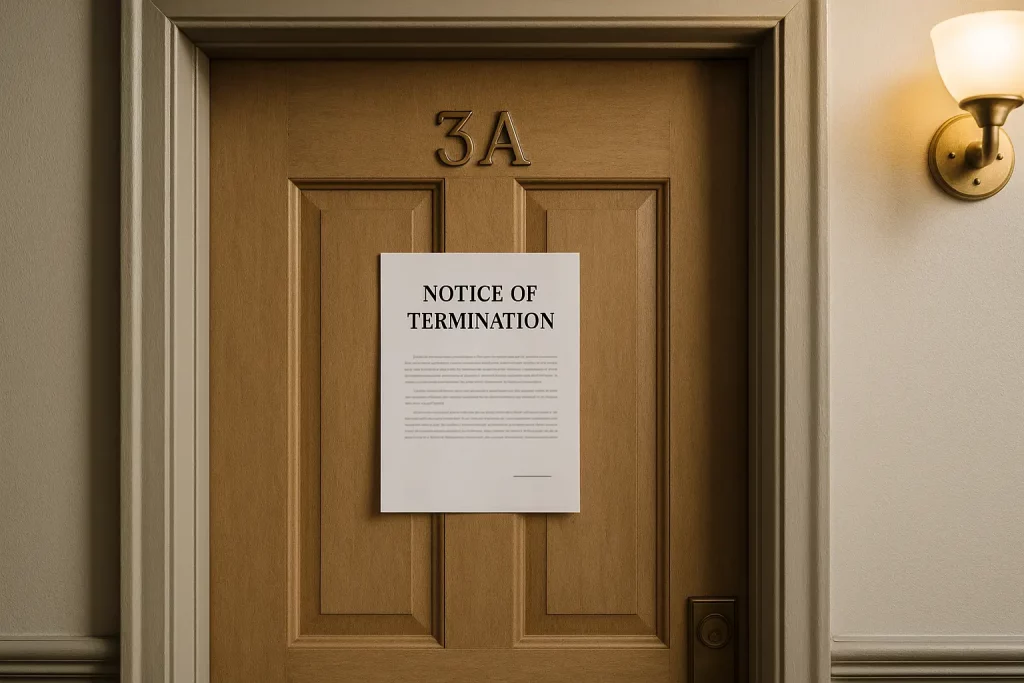
Protection from Retaliation
Chicago tenants are protected from retaliation when they exercise their legal rights. This means your landlord cannot punish you for taking certain lawful actions, such as requesting repairs or reporting code violations.
What counts as retaliation
Under the RLTO, it is considered retaliation if, within 12 months after you take protected action, your landlord:
- Terminates your tenancy
- Refuses to renew your lease
- Increases your rent
- Decreases services you normally receive
- Files or threatens to file an eviction case against you
Protected tenant actions
You are protected if you do any of the following in good faith:
- Complain to a government agency about building code or ordinance violations
- Request that your landlord make repairs required by law or your lease
- Seek help from a tenant union, community organization, or the media
- Testify in court or at an administrative hearing about your building or unit
- Exercise any right or remedy provided by the RLTO or other applicable laws
If one of these actions occurs and the landlord takes adverse action against you within 12 months, the RLTO presumes it is retaliation unless the landlord proves otherwise.
Remedies for retaliation
If retaliation occurs, you can:
- Defend against an eviction based on the retaliatory act
- Terminate your lease and move out
- Sue for the greater of two months’ rent or twice the actual financial harm you suffered, plus reasonable attorney’s fees
Example
You join a tenants’ union in your building and help organize a petition for better maintenance. Two months later, your landlord sends you a notice that your rent will go up by $400. Under the RLTO, this is presumed to be retaliation, and you could challenge the increase and seek damages.
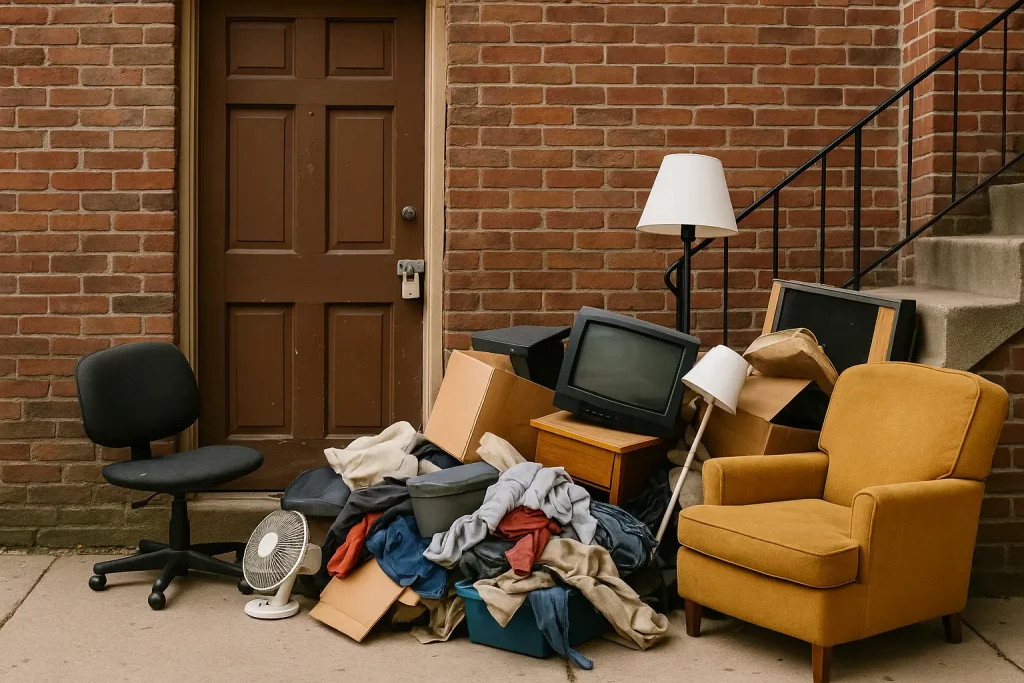
Protection from Illegal Evictions
Chicago tenants have the right to remain in their home unless a court orders otherwise. Illinois law prohibits “self-help” evictions, meaning your landlord cannot force you out without going through the formal court process.
The legal eviction process
To evict you, a landlord must:
- File a lawsuit for possession in court
- Obtain a judgment of possession from the court
- Have the Cook County Sheriff carry out the eviction
Only the Sheriff can legally remove a tenant from a rental unit.
Actions landlords cannot take
The RLTO makes it illegal for a landlord to try to force you out by:
- Changing, plugging, or removing the locks
- Blocking or sealing entryways
- Removing doors or windows
- Shutting off heat, electricity, water, or other essential services
- Removing your personal property from the unit
- Damaging or disabling fixtures or appliances
- Using or threatening physical force
- Making any part of the unit inaccessible or uninhabitable
Remedies for illegal eviction attempts
If a landlord attempts an illegal eviction, you may recover the greater of two months’ rent or twice your actual financial losses, plus reasonable attorney’s fees. The landlord can also face fines of $200 to $500 per day for as long as the violation continues. The Chicago Police Department is required to investigate these complaints.
Example
While you are at work, your landlord changes the locks because you are one week late on rent. You cannot get into your apartment, and your belongings are still inside. Under the RLTO, this is an illegal eviction attempt. You can call the police to have the locks restored and sue for two months’ rent, attorney’s fees. The city may also impose fines on the landlord.
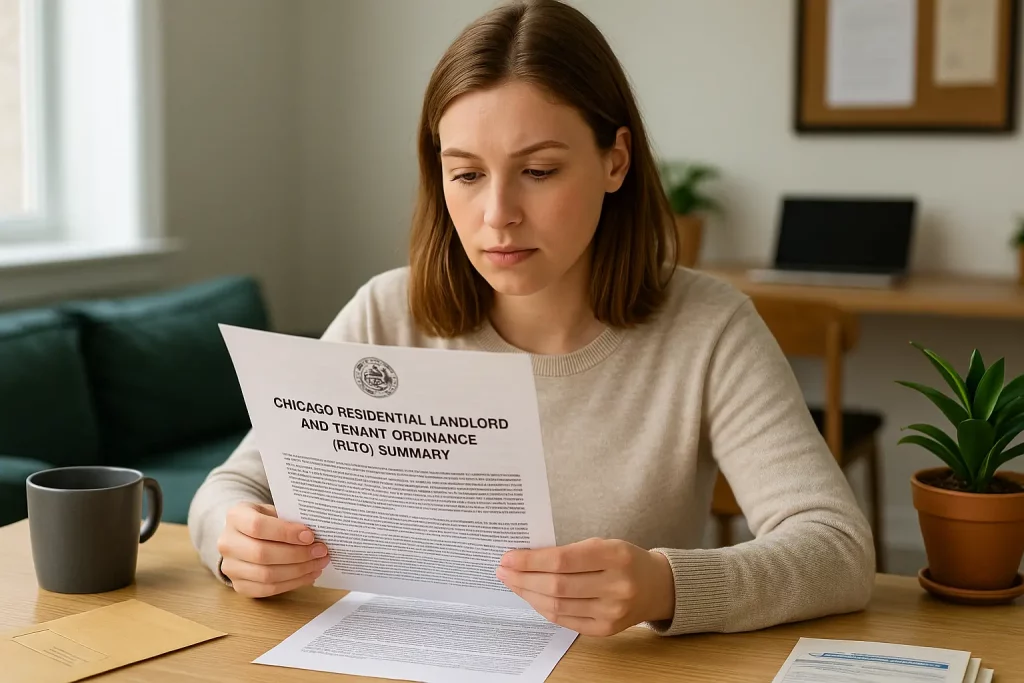
Right to Receive RLTO Summary
Chicago tenants must receive a written summary of the RLTO at the beginning of their tenancy or when renewing a lease. This ensures you are informed of your rights from day one.
When the summary must be provided
- Written leases: The landlord must attach a copy of the city-prepared RLTO summary to your lease or lease renewal.
- Oral leases: The landlord must provide you with a paper copy of the summary at the start of the tenancy.
The summary is created by the Chicago Department of Housing and is updated periodically to reflect changes in the law.
Why this matters
The RLTO can be complicated, and not every tenant knows their rights. By requiring landlords to provide this summary, the city helps ensure renters have basic legal information without having to search for it themselves.
Remedies for violations
If your landlord fails to provide the summary, you may:
- Terminate your lease with written notice
- Recover $100 in damages, plus reasonable attorney’s fees
Example
You sign a one-year lease, but the landlord does not include the RLTO summary. Six months later, you discover the omission while researching your rights. Under the RLTO, you can give written notice ending your lease and claim $100 in damages, plus attorney’s fees if you hire a lawyer.
What Happens If a Landlord Violates Chicago Tenants’ Rights
When a landlord violates the RLTO, the law provides a range of remedies for tenants. These remedies are designed both to compensate tenants for losses and to deter landlords from ignoring their legal obligations.
Possible remedies
Depending on the specific violation, you may be entitled to:
- Statutory damages calculated as a multiple of your rent or security deposit
- Termination of your lease without penalty
- Return of your security deposit plus penalties and interest
- Actual damages for financial harm you suffered
- Rent withholding until the problem is fixed
- Repair-and-deduct for qualifying maintenance issues
- Court orders requiring the landlord to stop illegal conduct or make repairs
- Possession of the unit if the landlord tries to wrongfully evict you
- Attorney’s fees and court costs if you win your case
Importance of documentation
The success of a tenant’s claim often depends on having clear records. Keep copies of all written notices you send or receive, photographs of any damage or unsafe conditions, receipts for repairs or substitute housing, and any communication with your landlord.
Example
Your landlord refuses to return your $1,000 security deposit, claiming you caused damage but failing to send the required itemized statement. Under the RLTO, you could sue for $3,000 (two times the deposit plus the deposit itself), plus interest and attorney’s fees.
Protect Your Chicago Tenants’ Rights with Brabender Law
If you believe your landlord has violated your rights under the Chicago Residential Landlord and Tenant Ordinance, you do not have to handle it alone. Brabender Law LLC represents tenants across Chicago in disputes involving unsafe living conditions, security deposit violations, unlawful late fees, and more.
Our attorneys can help you understand your options, take action to stop the violation, and recover the compensation you are entitled to.
Contact Brabender Law today to schedule a consultation and protect your rights as a Chicago tenant.

